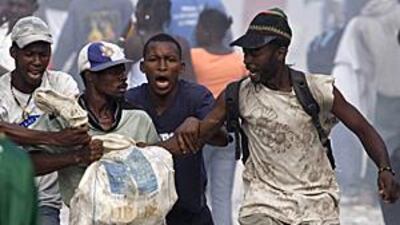PORT-AU-PRINCE // World leaders pledged massive aid programmes to rebuild Haiti but desperate earthquake survivors are still waiting for food, water and medicine. Five days after a 7.0 magnitude quake killed up to 200,000 people, international rescue teams clawed away at the rubble of collapsed buildings in the wrecked capital, Port-au-Prince, in a race against time to find more survivors. But logistical logjams kept major relief from reaching the hundreds of thousands of hungry Haitians waiting for help, many of them sheltering in makeshift camps on streets strewn with debris and decomposing bodies. "I'm going there with a very heavy heart. This is one of the worst humanitarian crises in decades. The damage, destruction and loss of life is just overwhelming," the UN secretary general, Ban Ki-moon, said as he boarded a flight for Haiti. Mr Ban arrived today and was met by the acting chief of the UN peacekeeping mission, Edmond Mulet. His first stop is going to be the five-storey UN headquarters that collapsed in the quake, burying the UN mission chief Hedi Annabi and many others. The United Nations was feeding 40,000 people a day and hoped to increase that to one million within two weeks, he said. "The challenge at this time is how to co-ordinate all of this outpouring of assistance."
As people turned more desperate and in the widespread absence of authority, looters swarmed over collapsed stores carrying out food and anything else they could find. Fighting broke out between groups carrying knives, ice picks, hammers and stones. Residents awoke to find the bodies of thieves lynched by mobs or shot by men claiming to be plainclothes police. A Reuters journalist said he saw the burnt body of a man locals said was set ablaze by angry residents who caught him stealing, and two young men lying on the ground with bullet wounds to the head and arms tied behind their backs. "Haitians are partly taking things into their own hands. There are no jails, the criminals are running free. There are no authorities controlling this," said a teacher, Eddy Toussaint, part of a crowd staring at the bodies.
Many Haitians streamed out of the city on foot with suitcases on their heads or jammed in cars to find food and shelter in the countryside. Others crowded the airport hoping to get on planes that arrived laden with emergency supplies and left packed with Haitians. The shell-shocked government has given the US military control over the tiny airport to guide aid flights from around the world. Dozens of nations have sent planes with rescue teams, doctors, field hospitals, food, medicine and other supplies, but faced a bottleneck at the airport, where fuel was in short supply. Some groups complained that their flights had been diverted to the neighbouring Dominican Republic, forcing them to carry emergency supplies into Haiti overland.
On the streets of Port-au-Prince, scarce police patrols fired occasional shots and tear gas to disperse looters and the distribution of aid appeared random, chaotic and minimal. Hundreds of lorries carrying aid and guarded by armed UN patrols streamed away from the airport and UN headquarters to different parts of the city. They were soon obstructed on streets clogged with people, vans carrying coffins and bodies and even makeshift roadblocks put up by homeless survivors forced to live and sleep out in the open. There were jostling scrums for food and water as US military helicopters swooped down to throw out boxes of water bottles and rations. A reporter also saw foreign aid workers tossing packets of food to desperate Haitians.
"The distribution is totally disorganised. They are not identifying the people who need the water. The sick and the old have no chance," said Estime Pierre Deny, standing at the back of a crowd looking for water with his empty plastic container. Aftershocks still shook the capital, terrifying survivors and sending rubble and dust tumbling from buildings. Three people were pulled out alive from a supermarket early yesterday. US and Turkish teams freed a seven-year-old Haitian girl, a Haitian man and an American woman from the rubble of the five-storey building. They were dazed but did not appear to be seriously injured.
Haitian government officials said the death toll was likely to be between 100,000 and 200,000. Dozens of bloated bodies have been dumped in the yard outside the main hospital, decomposing in the sun. The hospital gardens were a mass of beds with injured people, with makeshift drips hanging from trees.
Haiti's government is struggling to operate as the quake destroyed the presidential palace and knocked out communications and power. The president, René Preval, is living at the judicial police headquarters and holding cabinet meetings with foreign ambassadors outside, seated on plastic chairs.
"Everything in Haiti is broken. All the ministries are fallen. There is not one person in the country without a friend or family member dead," said the information minister, Marie Laurence Jocelyn Lassegue. "When they say the government is not fast, we are truly doing our best."
* Reuters

